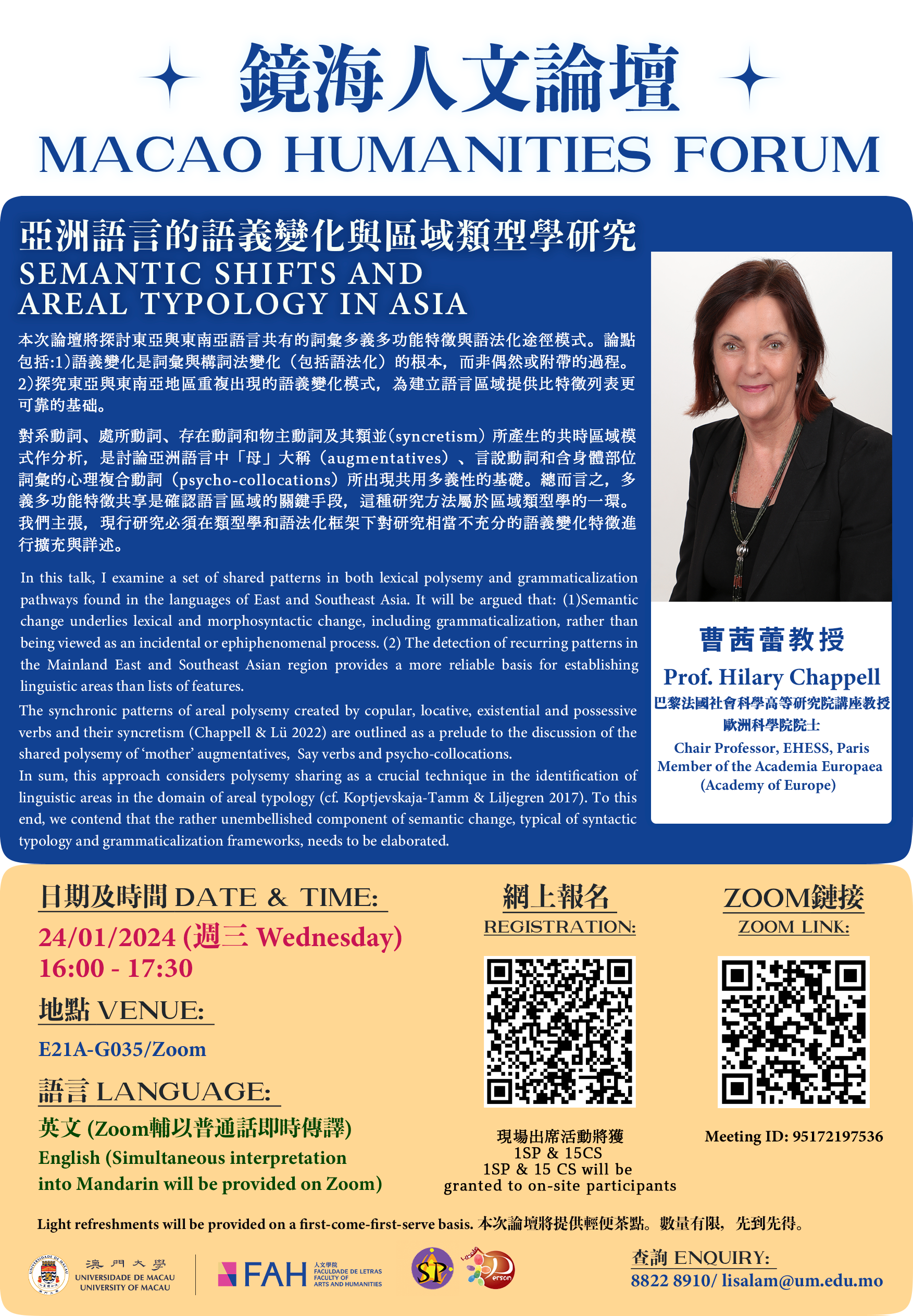

【Macao Humanities Forum】Semantic Shifts and Areal Typology in Asia by Prof Hilary Chappell from EHESS
2024-01-24 @ 4:00 pm ~ 5:30 pm
We are very pleased to announce that the 3rd Lecture of the FAH Macao Humanities Forum (2023/2024) will be held on 24 Jan 2024. The forum aims to provide a platform for world-renowned scholars from diverse humanities fields to share their research with the FAH community and other UM scholars. All members of the UM community are cordially invited to this splendid event.
In this upcoming forum, we are honored to have Prof Hilary Chappell as our guest speaker to deliver a lecture on the topic “Semantic Shifts and Areal Typology in Asia.” Hilary Chappell, a specialist in Sinitic linguistics, has served as Chair Professor in East Asian Linguistic Typology since 2005 at the EHESS, a prestigious research institute in Paris considered to be one of France’s “grands établissements.” Prior to this, she taught for 18 years in the Department of Linguistics at La Trobe University in Melbourne. Most recently, she has been appointed as Vice Chancellor’s Visiting Professor to the Chinese University of Hong Kong for the 2023-2024 academic year. Prof. Chappell has published four monographs, as well as 80 journal articles and book chapters. Over the past 30 years, she has presented more than 180 conference papers on linguistic typology and various Chinese language varieties, of which 70 were plenary or invited talks.
Details of the forum are as follows:
Speaker: Prof Hilary Chappell
Topic: Semantic Shifts and Areal Typology in Asia亞洲語言的語義變化與區域類型學研究
Date: 24 Jan 2024 (Wed)
Time: 16:00 – 17:30*
Venue: On-Site (E21A-G035) / ZOOM: https://umac.zoom.us/j/95172197536
Language: English (with simultaneous interpretation into Mandarin on Zoom)
*Light refreshments will be provided on a first-come-first-served basis
Abstract:
In this talk, I examine a set of shared patterns in both lexical polysemy and grammaticalization pathways found in the languages of East and Southeast Asia. It will be argued that : (1)Semantic change underlies lexical and morphosyntactic change, including grammaticalization, rather than being viewed as an incidental or ephiphenomenal process. (2) The detection of recurring patterns in the Mainland East and Southeast Asian region provides a more reliable basis for establishing linguistic areas than lists of features.
The synchronic patterns of areal polysemy created by copular, locative, existential and possessive verbs and their syncretism (Chappell & Lü 2022) are outlined as a prelude to the discussion of the shared polysemy of ‘mother’ augmentatives, Say verbs and psycho-collocations.
In sum, this approach considers polysemy sharing as a crucial technique in the identification of linguistic areas in the domain of areal typology (cf. Koptjevskaja-Tamm & Liljegren 2017). To this end, we contend that the rather unembellished component of semantic change, typical of syntactic typology and grammaticalization frameworks, needs to be elaborated.
Please register for the forum by 22 Jan 2024 (Mon) via https://umac.au1.qualtrics.com/jfe/form/SV_6LtAOLSozAEtsgK

